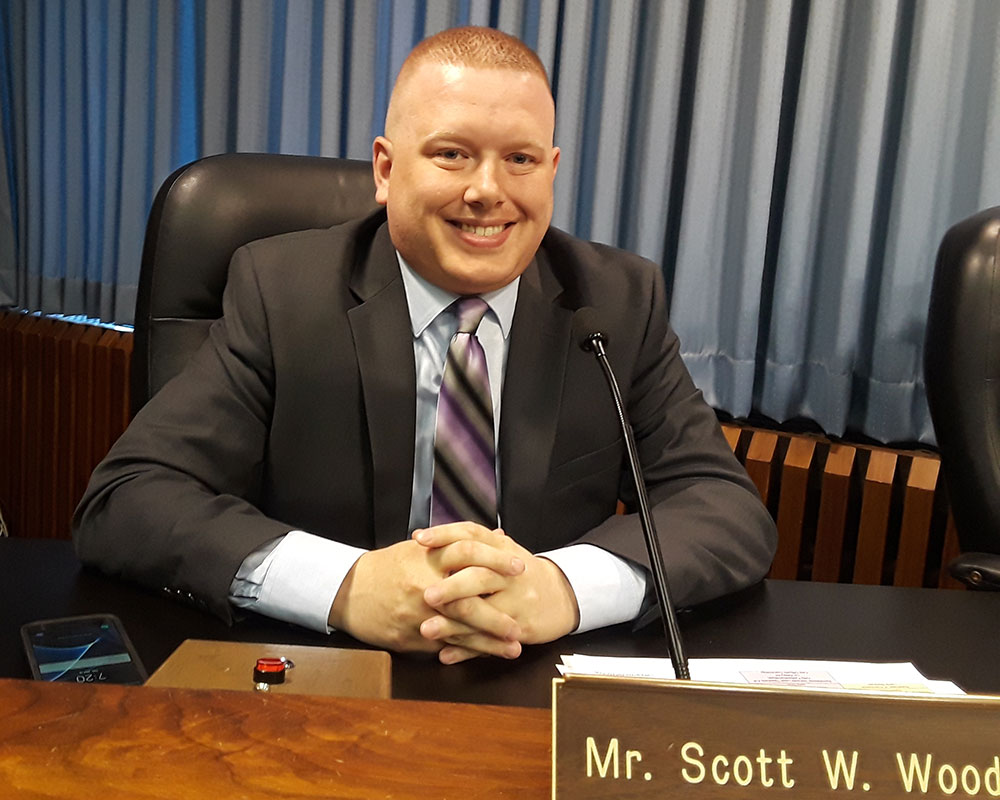Two different police background checks of a 20-year School Committee member and former police officer paint, at best, an unflattering portrait of the man who seeks to be Haverhill’s next mayor
Haverhill School Committee member Scott W. Wood Jr. filed suit Thursday, saying the oldest of the two background investigations—from a decade ago—lacked evidence and should have been destroyed.
Through public records requests, WHAV obtained the Jan. 26, 2013 background check by since-retired Deputy Police Chief Donald Thompson, a second background check by Haverhill Police Capt. Meaghan Paré, dated Feb. 15, 2022 and a summary of the allegations compiled by the office of former Essex County District Attorney Jonathan W. Blodgett.
Thompson’s report alleges “unprofessional and problematic behavior” including sending text messages calling Haverhill Mayor James J. Fiorentini a “Nigga Lover” and “Ass Monkey.” The follow-up on Thompson’s report by Paré also references Wood calling the mayor a “no good piece of monkey…”
The computer messages, according to the background check, were sent between 2007 and 2009 and intercepted by the FBI and Massachusetts State Police. Paré’s report identifies the recipient of the texts as David Keith, who had been under investigation since 2010 for an unrelated allegation of possession of child pornography. As WHAV reported in 2014, Keith was sentenced to 6.5 years in prison after pleading guilty to distribution of child pornography, possession of child pornography and accessing child pornography.
Haverhill Police Chief Alan R. DeNaro, however, told WHAV Sunday there were also at least two mistakes from the original background check—failure to obtain Wood’s side of the story on each allegation and not conducting a forensic check of Wood’s computer to confirm he was actually the one sending the off-color messages.
Thompson also wrote he met with Merrimack College Police Chief Michael Delgreco to review an employment folder to learn about Wood’s time at the college as a police officer. In the folder was a memorandum from Lt. Thomas Murphy to then-Merrimack College Chief Ronald Guilmette that reported, in Thompson’s words, “documented allegations of misconduct.”
These included allegations of “being disruptive at a sexual assault training” in June of 2009, where Wood allegedly called a female State Police officer a vulgar name; violating department rules by displaying his badge before he had completed his training and “activating his cruiser lights while in the town of Randolph;” and “inappropriately touching a female employee of the Merrimack College Police Department.”
Thompson also recounted a separate interview with Guilmette and was told “Wood had been given an opportunity to resign or be terminated.”
On Sunday, Wood pushed back in a statement, saying, “My good name was slandered by bullies in the shadows. I believe that my chances of clearing it as well as my candidacy for mayor will be best served by bringing all this sordid activity into the open.”
In his suit, Wood concedes he withdrew his 2012 application to become a Haverhill police officer after the damning background check. “In May 2013, the city and Officer Wood entered into a contract agreement where Mr. Wood would withdraw his application for employment with the Haverhill PD. In exchange, the city agreed to dispose of all copies of the background report from Donald Thompson within one year.” Wood’s lawyer also contends “The City further agreed that the background report would not be distributed to any third party, nor would the city provide any information about it to any third party unless compelled to do so by a court of law.”
DeNaro concurred, saying the agreement was intended to give Wood “three years to mature up.” Regarding Wood’s eventual hiring, the former chief said, “I had no reservations at all…I had an officer that other officers could look up to and the public would respect.”
The 2013 agreement may have become debatable, however, when Wood became a Wenham police officer the same month. That’s because U.S. Supreme Court decisions in Brady v. Maryland in 1963 and Giglio v. United States in 1972 suggest prosecutors have an obligation to notify defense lawyers of, for example, police misconduct that might speak to the credibility of officers testifying in criminal trials. Massachusetts has no uniform procedures for who or what is to be included on a “Brady List,” but district attorneys are nevertheless bound to keep similar records.
DeNaro contends Wood doesn’t fit the criteria for Brady listing because “He didn’t commit any crimes, didn’t qualify.”
Critics of such lists also argue police are often deprived of opportunities to respond or challenge entries. In fact, in the suit, Wood’s lawyer argues he was “erroneously” placed on the Brady List in December 2022 due to disclosures to the district attorney.
Besides Merrimack College, Wood previously served as a Regis College police officer. Wood’s suit also notes he was hired by Methuen Police in 2019 and, Thompson wrote, Wood also unsuccessfully applied for police jobs in Newbury, Essex and Hamilton.
Wood was elected to the Haverhill School Committee in 2003, two years after he graduated from high school, and became the youngest elected official in the city’s history.

